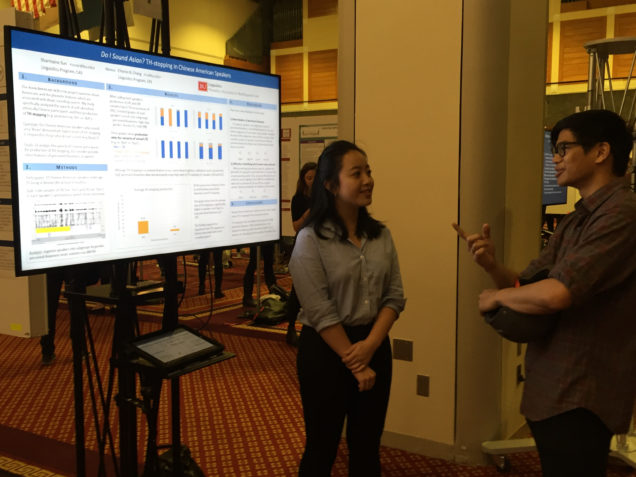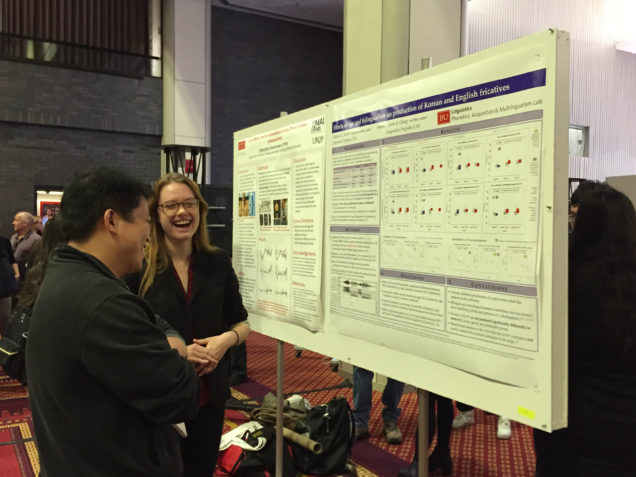Recent news
PAMLab at BUCLD 42
Prof. Chang presented results on L1 perceptual attrition (from collaborative work with Dr. Sunyoung Ahn) and results on L3 tone perception (from Vicky Chan's MA research) at this weekend's Boston University Conference on Language Development. The titles of the two talks were "Perception of non-native tonal contrasts by Mandarin-English and English-Mandarin sequential bilinguals" (slides here) and "The role of age and cross-linguistic similarity in first language perceptual attrition" (slides here).
PAMLabbies at UROP symposium
Sharmaine Sun (CAS '19) and Kathryn Turner (CAS '17) with their respective posters ("Do I Sound Asian? TH-stopping in Chinese American Speakers"; "Effects of Age and Bilingualism on Production of Korean and English Fricatives") at the Annual Undergraduate Research Symposium, hosted by the Undergraduate Research Opportunities Program (UROP). Great job, Sharmaine and Kathryn!
Congrats to UROP grant recipient
Congratulations to Sharmaine Sun, who was awarded a Fall 2017 Undergraduate Research Opportunities Program (UROP) grant to continue working on research in the lab this semester! Below is a brief description of the project she will be working on:
- Sharmaine Sun: "Language use and perceptions of Asian Bostonians"
Sharmaine will be working on a sociophonetic research project with two components: (1) examining features of English and heritage languages spoken by Asian Americans, across a range of ethnicities and life histories in the U.S., and (2) testing the perception, by both Asian and non-Asian American listeners, of Asian racial/ethnic identity in the speech of Asian American English users. Sharmaine will be involved in the analysis of pilot data on this project collected over the summer.
Paper on perceptual attrition in Language Learning
A research article entitled "Age effects in first language attrition: Speech perception by Korean-English bilinguals" (Ahn, Chang, DeKeyser & Lee-Ellis, 2017) has been published in the September issue of Language Learning.
Abstract: This study investigated how bilinguals’ perception of their first language (L1) differs according to age of reduced contact with L1 after immersion in a second language (L2). Twenty-one L1 Korean-L2 English bilinguals in the United States, ranging in age of reduced contact from 3 to 15 years, and 17 control participants in Korea were tested perceptually on three L1 contrasts differing in similarity to L2 contrasts. Compared to control participants, bilinguals were less accurate on L1-specific contrasts, and their accuracy was significantly correlated with age of reduced contact, an effect most pronounced for the contrast most dissimilar to L2. These findings suggest that the earlier bilinguals are extensively exposed to L2, the less likely they are to perceive L1 sounds accurately. However, this relationship is modulated by crosslinguistic similarity, and a turning point in L2 acquisition and L1 attrition of phonology appears to occur at around age 12.
This study followed Open Science practices, and all materials and data are publicly accessible via the Open Science Framework at https://osf.io/G4C7Z and https://osf.io/B2478.
Welcome to new labbies!
Welcome to the six students who will be joining the lab this semester to work on various research projects:
- Hye Youn Jo is a second-year graduate student in the TESOL EdM program (SED). Her interests are in phonology, psycholinguistics, second language acquisition, and bilingualism.
- William Longerbeam is a senior majoring in Linguistics. His interests are in phonology.
- Dominique Lopiccolo is a second-year graduate student in the Applied Linguistics MA program. Her interests are in second language acquisition, bilingualism, acquisition of phonology, and the cognitive interface between music and speech-language processing.
- Benjamin Wong is a sophomore majoring in Biomedical Engineering (ENG). He is interested in learning more about acoustics.
- Qian Yu is a freshman majoring in Linguistics. She is interested in bilingualism, acquisition, and phonetic variation.
- Elizabeth Zhao is a freshman (pre-med) in CAS. She is interested in learning more about language variation, neurolinguistics, and psycholinguistics.
Tone aptitude research in Psychology Today
Prof. Chang's work with Dr. Anita Bowles and Valerie Karuzis on tone aptitude (Bowles, Chang & Karuzis, 2016) was featured on the "Life as a bilingual" blog in Psychology Today:
Do Musicians Make Better Language Learners?
by Aneta Pavlenko (July 5, 2017)
PAMLab at ASA meeting
Prof. Chang presented new results on Korean fricative hyperarticulation (from collaborative work with Dr. Hae-Sung Jeon) in the Thursday morning poster session at this week's Acoustical Society of America meeting (5aSC. Variation: Age, Gender, Dialect, and Style). The title of the poster was "Effects of age, sex, context, and lexicality on hyperarticulation of Korean fricatives", and the poster can be viewed here.
Welcome to summer labbies!
Welcome to the twelve students, and two recent graduates, who will be joining the lab this summer:
- Kun Cao is a rising senior majoring in Biomedical Engineering. Her interests are in the linguistics and acquisition of Chinese.
- Juno Dong (interning from May 23 to August 4) is a rising senior majoring in Global Studies and French at Colby College. Her interests are in language acquisition and bilingualism.
- Christy Eichlin is a rising senior majoring in English and French. Her interests are in French linguistics and phonology.
- Emily Fisher (interning from May 23 to August 25) is a rising sophomore majoring in Linguistics at Georgetown University. Her interests are in Chinese linguistics and acquisition.
- Kendra Hennegen is an incoming graduate student in the Speech, Language, and Hearing Sciences program. Her interests are in language acquisition, cultural communication differences, multilingualism, and communication disorders.
- Jennifer Hollfelder (interning from August 1 to August 25) is a rising senior at Needham High School. Her interests are in phonetics, syntax, language acquisition, neuroscience, and multilingualism.
- Xinwen Hu is a second-year graduate student in the Applied Linguistics MA program. Her interests are in second language acquisition, bilingualism, phonetics, and the relationship between music and language learning.
- Katie Martin (interning from June 5 to August 4) is a rising senior majoring in Linguistics at Yale University. Her interests are in language acquisition, multilingualism, language preservation, and experimental linguistics.
- Abigail Ripin is a rising sophomore majoring in French and Linguistics. She is interested in dialect variation, language contact, multilingualism, and language disorders.
- Kevin Samejon (interning from June 15 to August 31) is a recent graduate of the Applied Linguistics MA program at Biola University. His interests are in language acquisition and processing, bi-/multilingualism, psycholinguistics, and phonetics and phonology.
- Sharmaine Sun is a rising junior majoring in Linguistics and International Relations. She is interested in sociolinguistics.
- Rachel Templeton (interning from July 10 to August 25) is a recent graduate of Stonehill College with a major in Psychology. She is interested in psycholinguistics, neurolinguistics, and bilingualism.
- Amira Yazghi is a rising sophomore majoring in Health Sciences and minoring in Psychology. Her interests are in language acquisition, language variation, and language change.
- Wayne Yoon is a rising senior majoring in Linguistics. He is interested in theoretical syntax and bilingualism.
Congrats to UROP grant recipients
Congratulations to Sharmaine Sun and Kathryn Turner, who were awarded Undergraduate Research Opportunities Program (UROP) grants to work on research in the lab in Summer 2017! Below are brief descriptions of the projects they will be working on:
- Sharmaine Sun: "Language use and perceptions of Asian Bostonians"
Sharmaine will be working on a sociophonetic research project with two components: (1) examining features of English and heritage languages spoken by Asian Americans, across a range of ethnicities and life histories in the U.S., and (2) testing the perception, by both Asian and non-Asian American listeners, of Asian racial/ethnic identity in the speech of Asian American English users. Sharmaine will be involved in both the collection and the analysis of pilot data on this project.
- Kathryn Turner: "Development of speech production in Korean-English bilingual children"
Kathryn will be continuing her work on a project comparing the speech production of young children acquiring both Korean and English with that of age-matched children acquiring only one of these languages. The goal of this project is to better understand how bilingual children differ from monolingual children with respect to the arc of their language development. Kathryn will contribute to the acoustic analysis of audio recordings from an elicited production task with 3- and 5-year-old children, focusing on fricative production.
Welcome to new lab members!
Welcome to the five students who will be working on research in the lab this semester:
- Megan Brown is a first-year graduate student in the Applied Linguistics MA program. Her interests are in second language acquisition, bilingualism, syntax, and second language education.
- I Lei (Vicky) Chan is a second-year graduate student in the Applied Linguistics MA program. Her interests are in first and second language acquisition, bilingualism, language perception, and research on tone languages.
- Malav Dave is a freshman majoring in Human Physiology (SAR) and minoring in Linguistics. He is interested in the relationship between language and human physiology as well as language acquisition.
- Brenden Layte is a second-year graduate student in the Applied Linguistics MA program. His interests are in bilingualism, psycholinguistics, language variation, autobiographical memory, and second language acquisition.
- Kathryn Turner is a senior majoring in Linguistics in the joint BA/MA program. She is interested in phonology, bilingualism, and Mandarin Chinese.

